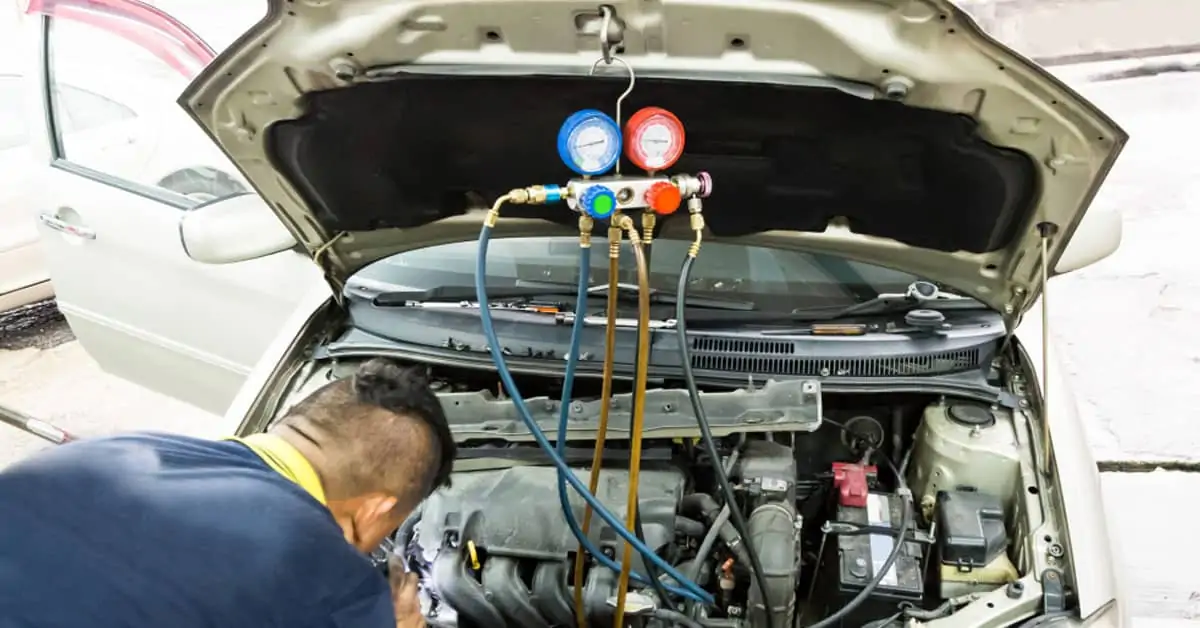If the Freon or refrigerant gets too low in your car’s air conditioner it will stop working. Over time your vehicle will leak Freon naturally, as well as damage causing bigger leaks. So how do you check your Freon levels?
Checking your Freon levels will require some specialized tools and equipment widely available. These are referred to as AC manifold gauge sets. This equipment will give you a very accurate reading of your Freon levels.
Checking for low Freon is one of the easier car maintenance actions you can take yourself and I’ll show you how it’s done. I’ll also point out possible warning signs your air conditioner is getting low on Freon. I’ll also explain how to replace Freon so that your air conditioner blows cold air as it should.
What Are The Signs I’m Running Out Of Freon?
Freon is the lifeblood of your air conditioning system so when it starts to run out, your system will not function. If you notice that it doesn’t blow cold air anymore, or only works for intermittent periods, that’s one of the most common signs your Freon is running low.
Even just a 10 percent loss of Freon can cause the air cooling capability to drop significantly. Some testing has shown this can be around 15 to 25 percent of loss of function.
Furthermore, the system has inbuilt processes which will automatically shut off the system to prevent damage to the components when low coolant is detected. Low coolant will have severe negative effects on the compressor and condenser.
How Do I Check For Low Refrigerants?
Leaks are a common cause of low Freon so must be checked as part of this process. If you’re finding you have to top up or refill Freon often, you almost certainly have a leak that needs to be addressed first.
Your air conditioner system should not be leaking refrigerant in a noticeable way.
There are special dyes that can be put through the refrigerant port which will reveal the location of leaks. Another option is spraying soapy water in the engine bay particularly on the various connecting hoses and watch for bubbling areas that may indicate leaks.
Once either the dye or soapy water is deployed, run the engine and turn up the air conditioner.
Any small leaks can normally be fixed by using automotive sealant tape or perhaps faulty connectors are better fixed by replacing hoses.
If there are no obvious leaks, then next is looking at the level of Freon in the system. As the system is pressurized, checking the system requires confirming that the internal pressure is correct using AC pressure checking equipment.
Keep in mind that Freon is dangerous and corrosive to skin and other soft tissues. Make sure you use goggles, thick gloves, and also appropriate clothing including long sleeves.
If Freon comes into contact with any part of your body it could cause significant injury. If you are not confident with taking appropriate safety procedures and performing intermediate level vehicle maintenance, a visit to a mechanic or air conditioner specialist is better.

To perform the pressure check will require a refrigerant pressure checker kit. Amazon sells several options with the AC Manifold Gauge Set being one of the best choices due to including the connectors to fit most vehicles.
First, you will need to find the low pressure line port. You can find this under the hood, normally marked with the letter L. Trace along any piping or hoses in the vehicle and the port should be coming off one of them.
You may also refer to the car’s manual or follow the included instructions that come with the equipment.
Generally, you should be getting a value of 40 psi of pressure. The gauge itself shows safe or green zones within which your reading should fall. To confirm, look under the hood to find a plate listing the factory Freon pressure values.
Do Freon Levels Need To Be Checked Regularly?
If the air conditioner seems to be running well and blowing chilly air, you don’t need to check it regularly. Any signs of damage, particularly weird noises or degraded performance of the air conditioning should prompt at least a pressure check
Importantly, a rough rule is that a vehicle may lose about 10% of its Freon per year. However, this figure will change a lot considering the climate the vehicle is in and the amount of usage the air conditioner gets.
If you notice that when you switch your air conditioner on you get either a sickly, sweet smell or a damp, musty smell it is definitely time for a service.
A sweet smell is indicative that Freon has leaked into the system itself and being blown into the cabin.
A musty smell will often be a sign of mold. The insides of the air conditioner can be prime locations for the growth of mold. This is because leaks of water result in pooling inside the vents or because the usual evaporative process is malfunctioning.
Mold should be taken care of as soon as possible as breathing it in is not very good for your health at all.
What Are Other Causes Of Loss Of Freon?
Air conditioning requires a refrigerant such as Freon and a pressurized pump system. The pressurized system is maintained by the compressor. This pressure compresses the gas causing a phase change which is the physical process causing the cooling.
Due to this pressure, holes or loose seals will be the weak points through which Freon leaks. As it is an odorless gas, there also won’t be obvious evidence such as a puddle of water or a smell to detect.
Leaks are commonly caused by road projectiles such as stones or debris leading to damage to the car.

